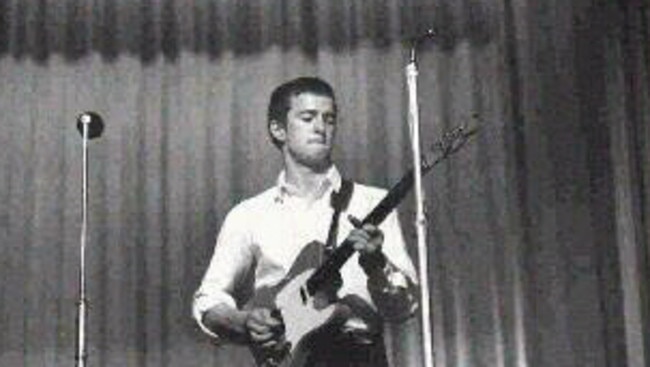Eric Clapton no stranger to pain and the blues
From a disaffected youth, Eric Clapton emerged as a guitar wizard to survive heroin, alcohol and cocaine addictions as he riffed with the cream of 1960s blues-rockers

Today in History
Don't miss out on the headlines from Today in History. Followed categories will be added to My News.
SCALPERS pocketed $4000 a ticket for upfront Madison Square Garden seats at a Cream reunion concert as Eric Clapton celebrated his 60th birthday.
A decade later tickets to Clapton’s 70th birthday Madison Square Garden concert are almost sold out again.
The illegitimate son of a Surrey teenager and Canadian serviceman was born in his grandmother’s back bedroom on March 30, 1945. From a disaffected youth he emerged as a guitar wizard to survive heroin, alcohol and cocaine addictions as he riffed with the cream of 1960s blues-rockers, including Jimi Hendrix, Duane Allman, Jeff Beck, BB King and Stevie Ray Vaughan.
“At about six or seven I began to get the feeling that there was something different about me,” Clapton revealed in 2008. “Maybe it was the way people talked about me as if I weren’t in the room.”
Named for his mother Patricia’s biological father, Reginald Clapton, the handsome, Oxford-educated son of an Indian army officer who died of consumption in 1932, from about age two Clapton was raised by his grandmother Rose and step-grandfather, master plasterer Jack Clapp.
At 15 Pat met Canadian airman Edward Fryer at a dance where he was piano player in the band. Pat learnt he was married when she found out she was pregnant.
“Rose and Jack protected her and I was born secretly in the upstairs back bedroom,” Clapton said.
Clapton, called Ric at home, enjoyed the attention of a large and loving extended family. His grandmother played piano and his uncle listened to big bands. His mother later described Clapton’s father as a gifted musician who played in several dance bands.
Clapton’s life shifted when Pat, then married to Canadian soldier Frank MacDonald, returned to Ripley with son Brian, six, and year-old daughter Cheryl in 1954.
“We went to meet my mother when she got off the boat ... down the gangplank came this very glamorous, charismatic woman, with her auburn hair up high. She was very good-looking, though there was a coldness to her looks, a sharpness,” Clapton recalled.
One evening in front of the family, Clapton “blurted out to Pat, ‘Can I call you Mummy now?’ During an awful moment of embarrassment, the tension in the room was intolerable. The unspoken truth was finally out. Then she said in a very kindly way, ‘I think it’s best, after all they’ve done for you, that you go on calling your grandparents Mum and Dad,’ and in that moment I felt total rejection.”
He had expected Pat to “sweep me up in her arms. My disappointment was unbearable, and almost immediately turned into hatred and anger.
“Things quickly became very difficult for everybody. I became surly and withdrawn, rejecting everyone’s affection, as I felt I had been rejected.”
As his above-average grades slipped, Clapton failed grammar-school entry exams and went to St Bede’s Secondary Modern School, where he befriended John Constantine. “We were so different from everybody else,” he said. “Neither of us fit in. While everybody else was into cricket and football we were into clothes and buying 78rpm records, for which we were scorned and ridiculed. We were known as ‘the Loonies’.”
Music became an escape valve for Clapton, who requested a guitar for his 13th birthday. Steel strings made his inexpensive Hoyer guitar difficult to play.
At 16 as a probationary student at Kingston College of Art, Clapton was expelled for not submitting enough work. His waking hours were spent practising the blues and recording his efforts on a reel-to-reel recorder.
He worked on building sites and busked until his first band experience with The Roosters in 1963. His reputation as the “most talked about guitar player on the R&B pub circuit” earned an invitation to join The Yardbirds in October, 1963. Over the next 18 months he earned his nickname Slowhands, apparently from slow-clapping by audiences as he changed guitar strings on stage, experimented with feedback, “fuzztone” distortion and amplification, and recorded his first album. After a brief run with John Mayall’s Bluesbreakers, by July 1966 Clapton had joined Jack Bruce and Ginger Baker as Cream, securing his reputation as a guitar superstar on Sunshine Of Your Love and White Room. Despite extensive touring and three albums, Cream lasted just two years.
By then in love with buddy George Harrison’s blue-eyed bride Patti Boyd, in 1970 Clapton formed Derek and the Dominos, scoring hits with Layla and Wonderful Tonight, written for Boyd. Harrison and Boyd split in 1974. She married Clapton in 1979. Harrison was best man. The marriage crumbled by 1984 and ended in 1988. Boyd had tired of Clapton’s addictions and infidelities, including a liaison with Italian model Lory Del Santo, mother of his son Conor. Clapton sought solace in music when Conor, at age four, fell 53 floors from an open window in his mother’s New York apartment in March 1991, to pen 1992 hit Tears In Heaven.


